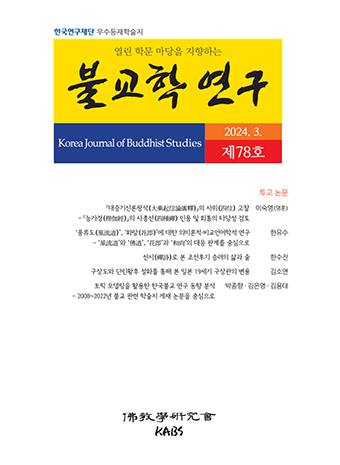Abstract
References
Sorry, not available.
Click the PDF button.
Information
We could agree to such a proposal that enlightenment (saṁbodhi) must be the ultimate end of Buddhism. But we could not reach the same opinion about the explanations on the enlightenment. Many scholars have respectively asserted ones' own opinion on this subject. The similar situation is also found in Early Buddhist Texts, that is, various explanations for the enlightenment have already existed since the early time. The heterogeneity of those explanations means that it is not simple to make plans and set up for a final goal of Buddhism. So I aimed at the consideration of all the aspects of enlightenment in early Buddhism, and attempted to choose the possible way to exercise in contemporary context. Then I come to reach the 80 ● 불교학연구 제19호 불교학연구회 제19호(2008. 4.) ● 81 conclusion that the insight meditation (vipassanā) would be suitable for general disciples, and that the utopia of enlightenment does not require any transempirical forms of perception as well. As for few studies, the enlightened state of mind may be that of a mystical, transempirical consciousness. I do not deny those interpretations of the enlightened state, especially in the case of Buddha himself and ascetics of samatha meditation. But I do not think that this transempirical approach of the enlightened state is recommendable for the general disciples. This conclusion makes me put an emphasis on the empirical approach of both enlightened state and the way to arrive at it.
Click the PDF button.
- Publisher :Korean Association of Buddhist Studies
- Publisher(Ko) :불교학연구회
- Journal Title :Korea Journal of Buddhist Studies
- Journal Title(Ko) :불교학연구
- Volume : 19
- No :0
- Pages :49~80


 Korea Journal of Buddhist Studies
Korea Journal of Buddhist Studies






